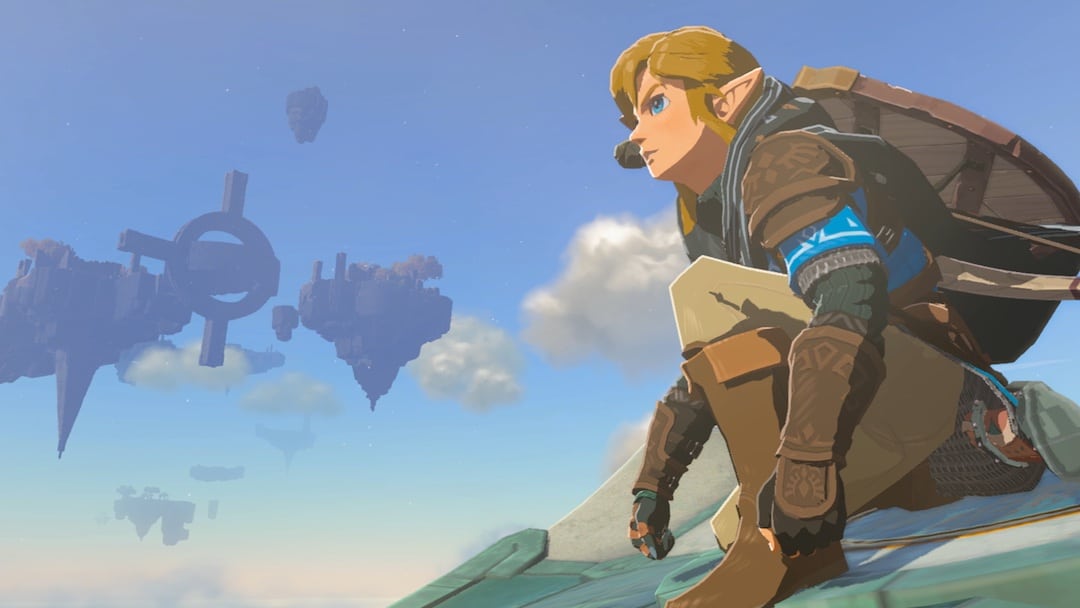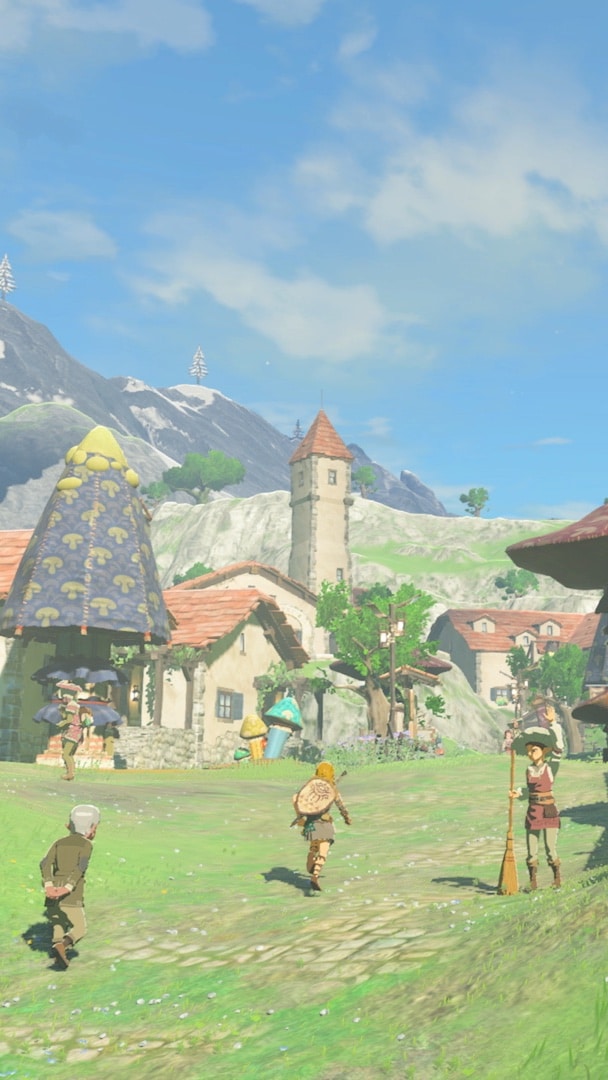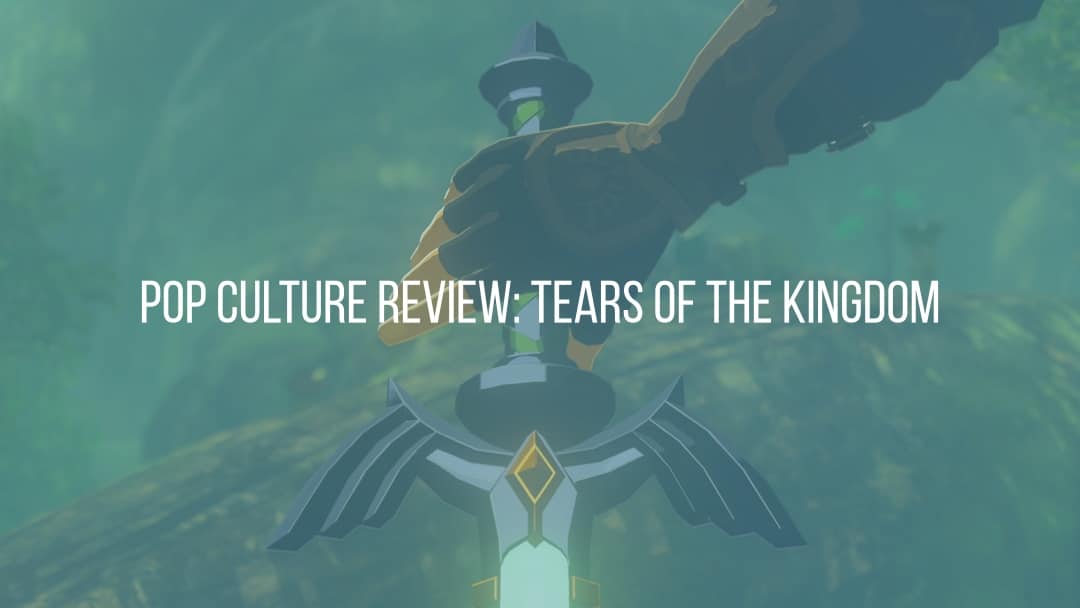This summer, millions of people across the world will be absorbed in a highly anticipated, years-in-the-making, high-fantasy adventure featuring evil sorcerers, legendary swords, dragons, and a classic struggle between good and evil. It is widely expected to sweep the industry awards for the year. You’d be forgiven if you thought I was referring to another high-budget peak TV series or a Hollywood summer blockbuster.
I’m actually referring to Nintendo’s The Legend of Zelda: Tears of the Kingdom, a video game released this year just in time for summer. 10 million copies sold in the first three days — impressive given the game’s $70 price tag.
I haven’t heard many pastors speak from the pulpit about video games beyond either alarm at the levels of violence in them or as a paradigmatic example of wasting time. I’ve never heard them treated with anything like nuance or an appreciation of the fact — like it or not — that they are now as much a part of our culture as music, TV, and film. One study by the Entertainment Software Association found that 2/3 of Americans play video games of some variety or another. And it is no longer an activity limited to children, the same study found that more adults over 45 years played video games than children under 18.
I want to consider Tears of the Kingdom along the same lines as any of our other pop culture reviews at TPW. A few of you might find the time (and it does take some serious time) to play the game — but I don’t really expect that you will. Still, it is worth understanding something about this pop culture phenomenon and what it means. There are a lot of things to talk about, but I’ll limit myself to two main topics: the portrayal of good and evil in Tears of the Kingdom and the role of fairy tales in the Christian life.
Let’s start by saying something about what this game is.
What is Tears of the Kingdom?
Since the release of the first Legend of Zelda game in 1986, the series has been one of Nintendo’s tentpole properties. The games are all third-person adventure games, with the player controlling the protagonist, Link, as he navigates (legendary sword in hand) a high-fantasy world inspired by Tolkien, Arthurian legend, Greek myth, and Japanese folklore. Usually the quest is to “save the princess” — though the princess’s agency has increased substantially over the series.
Tears of the Kingdom is a sequel to Breath of the Wild, which released in 2017. Both are “open world” games in which the player is given an entire world to explore, rather than being funneled through the world artificially in service of a linear story.

Image courtesy of Nintendo
They are both set in Hyrule, an expansive fantasy world with snowy mountains, flowing rivers, steamy jungles, and sparkling seas. Monsters and fantastical creatures abound. This world, once abundantly populated, was wracked by an ancient calamity (the work of a sorcerer named Ganon), which nature has done its best to heal, leaving the player vast wild areas dotted with ruins to explore. Hyrule is gorgeous, not rendered photorealistically, but like a beautiful animated film. And, true to their “open world” style, the player is given access to every inch of it, to explore, tame horses, climb mountains, swim across rivers, and to fight the monsters roaming the countryside.
As for plot (to be very brief), in Breath of the Wild, the player was thrown into the world mostly helpless (and without a memory) and tasked with teaming up with Princess Zelda to defeat Ganon and save Hyrule.
Tears of the Kingdom picks up several years later, with Hyrule slowly starting to rebuild under Zelda’s care. The Demon King, an ancient evil imprisoned under Hyrule Castle awakens — his onslaught tearing holes in the earth and causing enormous sky islands to descend. Link is nearly killed by the Demon King, his legendary sword destroyed along with his arm that wielded it.
The player’s task (as the hero Link) is to find Zelda and defeat the Demon King. This time around, Link has a magical new arm (the source of new powers) and access to the sky and a (huge) pitch-black underworld. The surface world of Hyrule, familiar to players of Breath of the Wild, is changed both by the passage of time and the coming of the Demon King, rewarding fresh exploration.
Most game changing is a new feature which allows the player (through Link) to construct objects out of smaller objects found all over Hyrule. Players can make flying machines, ground vehicles, weapons, buildings — the list goes on. YouTube abounds with videos of new contraptions players have created. This feature synergizes with the theme of exploration, allowing players to traverse the map in new ways, with various puzzles now depending on whether one views something from the sky or on the ground.
In Hyrule Good is Good and Evil is Evil
As a pop culture review, we need to move to thinking about what Tears of the Kingdom means from a spiritual and moral point of view.
One of the most conspicuous things about Tears of the Kingdom is that it immerses the player in an uncynical and deeply moral story-universe.
Your character is a hero. There is nothing morally gray about Link. If you do what the game sets out for you to do, you will act out sacrificial courage, loyalty, kindness, wisdom, and even piety.
Further, goodness is presented as a community matter. In most other Zelda games, Link is a lone swordsman — in this game he is literally surrounded (after a certain point in the game) by a community of heroes. As the game progresses, you gather a group of other heroes around you who are your friends and who each in their own way embody the heroic virtues as well.
Civic-mindedness and community-orientation are a major theme of the game. Many of the characters you run into throughout the game are in one way or another consciously contributing to the good of everyone. Life in Hyrule may be hard, but it generally seems to engender community-mindedness.
In general, in Hyrule, evil is evil and good is good.

Image courtesy of Nintendo
Goodness is rewarded by the game and roundly praised. And evil is never glorified. Where it is not terrifying and repulsive, it is presented as stupid and buffoonish.
This is, I think, one of the great strengths of this game. Spaces where goodness is praised without equivocation are rare in our culture.
Is Evil Too Unattractive in Tears of the Kingdom?
At the same time, we should consider whether this is a weakness as well. There is none who is righteous — no, not one. Alexander Solzhenitsyn wrote that “the line between good and evil runs… right through the human heart.” Evil is so unattractive in this game that it is largely relegated to the monstrous servants of the Demon King.
But we know that this is not reality. Evil is often attractive and whatever good we do, evil runs through our hearts too. Being good is simply too easy in the game.
This presents a dilemma for developers: how do you build a game that allows a player significant freedom to make morally interesting choices? If you aren’t careful, you will make doing good trivial. On the other hand, the freedom to make bad choices can be incentivized because it unlocks otherwise unknown possibilities in the game.
Fairy Tales and Adults
I remember someone asking Al Geier, a classicist and philosopher, what people should be reading for intellectual enrichment. His response was not Plato, Aristotle, or any of the usual “greats,” but fairy tales.
I think he had in mind something like what G. K. Chesterton writes in Orthodoxy’s chapter “The Ethics of Elfland”:
This elementary wonder, however, is not a mere fancy derived from the fairy tales; on the contrary, all the fire of the fairy tales is derived from this… We all like astonishing tales because they touch the nerve of the ancient instinct of astonishment… This proves that even nursery tales only echo an almost pre-natal leap of interest and amazement. These tales say that apples were golden only to refresh the forgotten moment when we found that they were green. They make rivers run with wine only to make us remember, for one wild moment, that they run with water.
Adults take it for granted that things will happen as they do. We lose our childlike wonder at the fact that things actually do happen that way. As a matter of fact, the creator of the Zelda series, Shigeru Miyamoto, has cited his childhood experiences of wonder and surprise exploring forests and caves near his home as inspiration for the exploration-based series. We need the wonder Miyamoto and Chesterton are interested in for gratitude, horror, and imagination — things which are essential for the Christian life.

Image courtesy of Nintendo
We lose all gratitude when we accept that what happens is inevitable — the product of fate or blind natural laws. There is no room for it. What happens happens. It is what it is. But fairy tales remind us that very little outside of math and logic is actually inevitable. The laws of nature are as they are by divine choice. And the good that happens to us is providential. Thanksgiving is a non-optional part of the Christian life — but it cannot exist if everything is fixed by necessity.
Is the emotion of horror necessary for the Christian life? This may sound a little odd. It is. The fall of humanity is objectively horrible. The long, sordid story of sin and evil is a horror story. It doesn’t matter that it has a happy ending or that God will redeem all things — horror at sin and evil is the right emotional reaction.
Necessity kills horror. How can we reject what must happen of necessity? Indeed, accepting what is inevitable is part of the center of the philosophy of Stoicism. Necessity is the Novocain of the soul — and why Christians must reject it. Sin and evil are not inevitable. They are not to be accepted, but wholly rejected by the Christian, and prevented where possible. God may allow evil — and therein lies the thorny problem of evil, but he rejects it, just as we ought to.
Perhaps increasing acceptance of what occurs without wonder is necessary to adulthood — perhaps it would be too exhausting for us to get on with life to be wondering at every little contingency. But dulling our sense that things do not have to be as they are also dulls our imagination. And imagination is of the greatest importance to Christians.
We must constantly re-imagine the world, not as it is, but as it should be… as God envisions it. We must imagine our own life with less sin, with greater holiness. Only by seeing the alternatives to the ordinary trajectories of our lives and the systems in which we live can we break out of sinful habits that ensnare us and the sinful systems which perpetuate injustice. Imagination always precedes action (though it can, unfortunately, occur without any action).
Tears of the Kingdom is steeped in wonder and possibilities — it is a modern fairy tale in the sense that Chesterton had in mind. Every bend in the road reveals new discoveries, new adventures. Every cave is a possibility. Will there be treasure?

Image courtesy of Nintendo
Nothing must be as it is in Hyrule. It is as the storytellers — the programming team — have made it. That the dawn sky, viewed above the clouds from a Hyrulean sky island, is beautiful, is because it was programmed that way. This should remind us that the reason that a beautiful sunset in the real world reminds us of the Creator is because we intuitively realize that sunsets might not have been beautiful at all — or we might not have been crafted to perceive their beauty.
A Conversation that Needs to Continue
I’ve just scratched the surface. Much more needs to be said about Tears of the Kingdom and video games in general, especially as they quickly evolve as an art form and gain greater cultural weight. Even those things I’ve raised, the role of good and evil in stories, how freedom and responsibility should be played out in a virtual domain, and the role of imagination all need further discussion. I’ve completely skipped over difficult questions about race and gender in video games and also the interesting role religion plays in Zelda games. Perhaps you’ll have an opportunity to discuss these things with gamers (young or old) in your congregation!
All images courtesy of Nintendo. Cover image modified with text and overlay.

Bill Rowley (PhD, University of Rochester) is an executive assistant for The Pastor’s Workshop. An epistemologist and philosopher of religion, he has taught courses in philosophy and college-level writing and worked as an editor. He lives in Hamden, Connecticut with his wife and two dogs.
Don’t Miss
The Latest From Our Blog
New Site Launches Tomorrow!
Watch this Space! Tomorrow (May 29) is the official launch of the new The Pastor's Workshop site! Return to this blog tomorrow morning for a post highlighting the new features and explaining how subscribers can get on and start using the site! Here are some new...
How You Can Prep for Pentecost
This was originally posted on May 12, 2016 on https://huffpost.com Pentecost Came Like Wildfire I'm lying on an ice pack early this morning, doing my back exercises and listening to Pray as You Go, a tool for meditation, with monastery bells, music, and a Bible...
Sacred Spaces: the Church Forests of Ethiopia
Let's Go to Ethiopia! Here’s a fun exercise with a spiritual payoff. Go to Google Maps and view aerial images of the South Gondar zone of Ethiopia. Use this button:When the page loads, you'll see a light brown countryside, mostly farmland. There are thin lines of dark...




